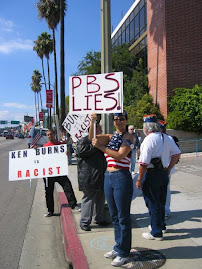At the close of Teatro Campesino’s 1972 film “Los Vendidos/The Sellouts,” originally a play written by Luis Valdez, a menagerie of stereotyped ethnic Mexicans — e.g., an “esa” and a pachuco cruising in a classic 1950s-era Fleetline, a Frito Bandito-like Mexican revolutionary, a monolingual Spanish-speaking housewife who serves her viejo Kool-Aid, campus militants, and a Spanish conquistador — gather around Luis’s character, a somnolent “Mexican peon.”
 |
Before the final scene, Ms. Jimenez (who stressed her Anglicized surname as “Ms. Gym-eh-Nez,” as opposed to “Hee-meh-nez”), a factotum from the governor’s office, presumably of California, procured a Chicano, named Eric (not Kiki, the endearing cognomen used by his peers) whose assignment was to masquerade as a business attired, college-educated, fluently bilingual, “made in the U.S.A,” Mexican-American.
After attaining the attention of the cast, who moaned and stretched from their fixed poses, Luis lays out a map on the floor of Honest Sanchos Used Mexican Shop. Then he pointed out, “We got Chicanos infiltrated in every urban center in the U.S.: Los Angeles, San Francisco, Denver, Chicago, New York, Washington, Rumford, Maine.”
Yes. Even in Rumford, Maine!
For me, Ventura County Supervisor Carmen Ramirez was such a Chicana who had infiltrated the power structure of landed dynastic families and capitalist interests to fight on behalf of our community — ethnic Mexicans and other historically underserved peoples that included lumpen proletariat, poor whites — on various boards, councils, and bodies dominated by male and female Anglos.
 |
As an educator succinctly memorialized on social media, Carmen was “our champion” as we knew she was watching out for us — La Raza/the people.
As the daughter of a WWII US Army veteran, our querida Carmen grew up in the East Los Angeles community of Pico Rivera and came of age during the fervor of El Movimiento Chicana/o. She navigated circles of renowned groups and figures of that time. One included Oscar Zeta Acosta (aka the Brown Buffalo); the once assimilated, self-loathing Mexican American who worked as a legal-aid attorney in Los Angeles only to find himself caught up in the zeitgeist of the late 1960s and ’70s.
Carmen also was well connected to civil rights activists like Alice Greenfield McGrath, the once executive secretary of the Sleepy Lagoon Defense Committee as well as United Farm Workers movement organizers, ascending and arrived politicians, and the intelligentsia.
After her education at Cal State LA, Carmen was admitted to Loyola Law School after Acosta, Los Católicos Por La Raza, and Chicana/o regulars jammed up Cardinal James McIntyre and the archdiocese in 1969 for its hubristic institutional neglect of the needs of the ethnic Mexican community. Carmen understood that the militantly-righteous trouble of El Movimiento had busted open doors to improve the life chances of los de abajo, the hoi polloi, of our society and that she was one of its beneficiaries.
Hence, she paid forward this obligation with sophistication as a citizen-professional in solidarity with her community.
As a politician, however, Carmen did not publicly pronounce her Chicana identity as it would have been unwise to do so. But her friends knew she was a nueva Chicana as she cunningly demonstrated, without fail, a commitment to advancing the interest of the underdogs. As I write, I am reminded of her fierce defense of her people as a private citizen and elected official against gas, electric, and oil companies who dared not contaminate or compromise the safety of more affluent, whiter communities with their ventures, but for them poor, predominantly brown areas were open game.
And knowing that education was a weighty mace against such injustice, over the past twenty years Carmen committed herself to California State University Channel Islands’ development, even before the appointment of its earliest tenure-track faculty starting in 2001.
I got to know Carmen when she was a member of the university’s community advisory committee. As she did as an Oxnard councilmember, Mayor Pro Tem, and county supervisor, she made certain, in her signature diplomatic yet powerfully measured manner that Ventura County’s only public university would have a faculty, curriculum, and programs that equitably served and reflected the interests of the demographic makeup of its service area.
For example, in 2005, when presumptuous functionaries of CSU Channel Islands decided to strike the BA degree in Chicana/o Studies from its academic master plan, Carmen attended a campus conversation of administrators, students, staff, and faculty. After listening to the views in support of Chicana/o Studies and others for a milquetoast multicultural program, Carmen spoke.
With a poetic equanimity, she asked, as a CSU alum, why this was an issue when just about every campus in the system had Chicana/o Studies. This was a huge intervention that aided Chicana/o Studies' ultimate institution.
Later, Carmen would attend events of CSU Channel Islands’ Chicana/o Studies Department: an open house, exhibits, lectures, and ceremonies. From afar, I often viewed her classically warm smile as she basked in the glory of the history and culture of her community.
Thank you, Carmen, for being a Chicana infiltrator in many positions of power.
C/S
fpb


No comments:
Post a Comment